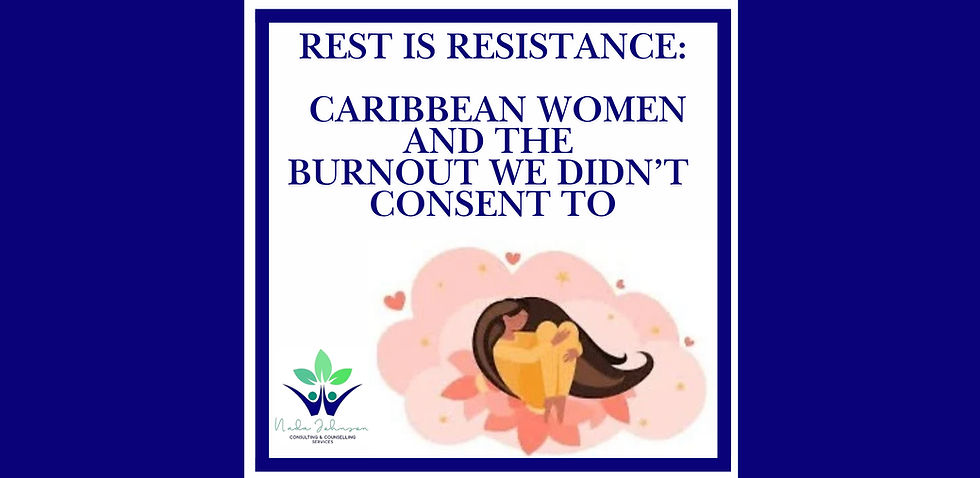Beneath the Accent: How Caribbean Women Navigate Linguistic Discrimination in Canada
- Nada Johnson

- Jun 25, 2025
- 4 min read

“Where are you really from?”
For many Caribbean women in Canada, this question isn’t just a conversation starter it’s a reminder that their voice, accent, and identity are often viewed as foreign, even when they call this country home.
Caribbean women navigating life in Canada often face subtle and overt linguistic discrimination. From being told their accents are “too strong” for professional settings to being asked to repeat themselves in classrooms, boardrooms, and hospitals, these experiences reinforce feelings of exclusion and inferiority (Creese & Kambere, 2003).
The Cost of “Code-Switching” and Silencing
Many Caribbean women learn early on to code-switch modifying their speech to appear more “Canadian” to avoid judgment or exclusion. But this constant self-monitoring can be emotionally exhausting and psychologically damaging. Studies have shown that the pressure to alter one’s natural speech pattern contributes to anxiety, loss of cultural pride, and feelings of inauthenticity (De Leon, 2019; Levon, 2016).
Linguistic discrimination doesn’t just affect self-esteem it impacts job opportunities, classroom participation, and access to services. Caribbean women have reported being underestimated or passed over for leadership roles due to how they speak, reinforcing systemic barriers already faced due to gender and race (Maitra, 2015).

Language, Power, and the Legacy of Colonialism
The English spoken in the Caribbean often infused with Creole or Patois has deep historical roots. Yet, in many Canadian spaces, these dialects are seen as “improper” or “broken,” a mindset rooted in colonial hierarchies of language that privileged British English and dismissed all others (Pierre, 2016).
This not only delegitimizes the linguistic richness of Caribbean culture but also reinforces a belief that Caribbean women must shrink, shift, or suppress their identity to be accepted.
The Mental Health Impact🧠
When a woman constantly hears that her voice is a problem, it becomes hard not to internalize the message that she is the problem. Research has linked linguistic discrimination to chronic stress, identity confusion, and lower levels of psychological well-being among racialized women (Williams, 2018; Lippi-Green, 2012).
The microaggressions may be quiet but their effects are loud:
Self-doubt in interviews
Withdrawing from classroom discussions
Feeling “out of place” even after decades in Canada

💬 What I Help With at NJCCS
At Nada Johnson Consulting & Counselling Services (NJCCS), I work with Caribbean women who feel unseen, unheard, or unaccepted not because of who they are, but because of how they sound.
Whether you're battling internalized shame or just exhausted from trying to be understood, my practice provides a healing space grounded in cultural understanding, compassion, and advocacy.
Here are 5 ways I help Caribbean women navigate linguistic trauma and reclaim their identity:
Affirming Identity – We unpack harmful narratives around your accent and affirm the cultural richness of your speech and heritage.
Coping With Microaggressions – Learn emotional regulation tools and boundary-setting strategies for navigating workplace, school, and social settings.
Reclaiming the Right to Speak Up – We explore where silence began and practice rebuilding voice and assertiveness in a safe space.
Addressing Cultural Guilt – Together we release guilt around “sounding too Caribbean” or “not sounding Caribbean enough,” which often stems from intergenerational trauma.
Building Self-Compassion – Develop inner tools to counter the self-doubt and perfectionism that code-switching often reinforces.

🗣️ You Don’t Have to Keep Silencing Yourself
Healing begins when we stop seeing our accent as a flaw and start seeing it as a form of cultural survival.
If you're ready to release the pressure to constantly adapt, hide, or code-switch NJCCS is here for you. Let’s make space for your full voice, your full truth, and your full self.
📩 Book a session at nadajohnsonservices.com
Warm regards,

Nada Johnson, MSW, RSW
Registered Social Worker, Psychotherapist / trained Family Mediator / EMDR Trained Therapist / Certified Racial Trauma Clinician / Mental Health & Sexual Violence Consultant / Professional Speaker

🌍Website: www.nadajohnsonservices.com
📩 Contact: info@nadajohnsonservices.com
Nada Johnson Consulting & Counselling Services - Online phone and video sessions available
Village Healing Centre: 240 Roncesvalles Avenue
C: 437-887-6146
Click here to join our newsletter and follow our platforms for empowering content, trauma recovery tools, and mental health support. Please share this post to help break the silence around trauma and promote healing in our communities. 🤝
References
Creese, G., & Kambere, E. N. (2003). What colour is your English? Canadian Review of Sociology/Revue canadienne de sociologie, 40(5), 565–573. https://doi.org/10.1111/j.1755-618X.2003.tb00701.x
De Leon, K. (2019). The burden of sounding “professional”: Code-switching and mental health in racialized communities. Journal of Language and Identity, 2(1), 45–58.
Levon, E. (2016). Conflicting selves: Language, emotion, and the construction of the Caribbean woman. Language in Society, 45(2), 243–266.
Lippi-Green, R. (2012). English with an accent: Language, ideology, and discrimination in the United States (2nd ed.). Routledge.
Maitra, S. (2015). Transnationalism and identity among skilled Caribbean women in Canada: Disrupting notions of race, gender, and professional identity. Women's Studies International Forum, 50, 1–9.
Pierre, J. (2016). The predicaments of Blackness: Postcolonial Ghana and the politics of race. University of Chicago Press.
Williams, C. L. (2018). Linguistic discrimination as trauma: Implications for racialized women in workplace and healthcare settings. Canadian Journal of Counselling and Psychotherapy, 52(3), 237–251.

Want More Support for Your Professional & Personal Growth?
🔷Try Potential Unlocked™
In addition to counseling, NJCCS offers coaching through our sister brand, Potential Unlocked™, designed specifically for professional women navigating career, leadership, and life transitions.
We support clients with:
Communication and conflict strategy in the workplace
Career development and leadership coaching
Navigating workplace dynamics and burnout recovery
Building confidence in both personal and professional relationships (Online dating empowerment coaching, because personal growth impacts professional life too!)
👉 Visit www.potentialunlocked.ca to learn more or book a free 10-minute consultation call.




Comments